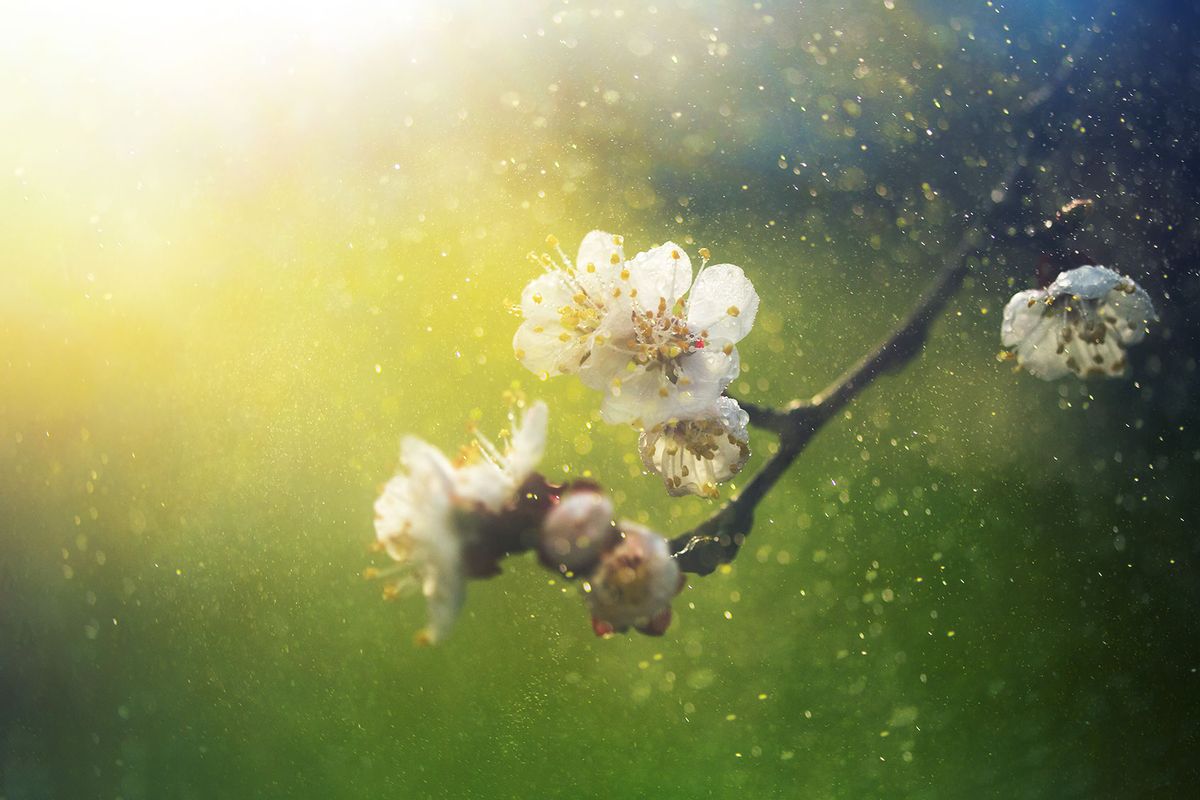A telltale sign of the arrival of spring is the onset of seasonal allergic rhinitis, usually marked by a runny nose, watery and red eyes, or an itchy throat, ears, and palate. But this year, many Americans are finding that their allergic symptoms are not merely unpleasant, but downright unbearable — and in some cases, worse than they've ever experienced before.
On Twitter, a deluge of posts bemoans the severity of this year's allergy season, with users frantically searching for relief from the onslaught of symptoms. Searches for terms like "are allergies bad today?" skyrocketed in April, as people seek answers to this sudden and intense wave of daily discomfort.
It's not just your imagination: allergies really are getting worse this year. But what could be driving them?
Some of the blame can be laid on weather. According to the NOAA March 2023 climate report, the precipitation total for the contiguous U.S. was 0.30 inch above average, ranking in the wettest third of the 129-year record. Indeed, precipitation was above average across much of the West, and from eastern Oklahoma to the Great Lakes. This increase in precipitation is likely affecting this season's allergies.
"Many are saying that likely due to the unseasonable winter weather, it's been a lot wetter in [the] southwest than previous years, is contributing to longer pollen seasons and higher amounts of pollen," Dr. Purvi Parikh, allergist and immunologist with Allergy & Asthma Network told Salon. More precipitation, Parikh said, "contributes to early, longer and higher levels of pollen."
"[More precipitation] contributes to early, longer and higher levels of pollen."
Indeed, the severity of allergy symptoms boils down to the pollen count, and how long pollen counts are high. Pollen is essentially flower sperm. In the spring and fall, it is released from seed plants, and flies through the wind to fertilize other plants. According to the Allergy and Asthma Foundation of America (AAFA), pollen — which commonly comes from trees, weeds and plants — is the most common trigger of seasonal allergies. Pollen counts estimate how much pollen is in the air using a device called an air sampler that captures the pollen.
When the pollen count is high, people usually have more severe reactions, which can sometimes be asthmatic. A pollen allergy occurs when one's immune system identifies pollen as dangerous, which is why limiting time outdoors during a high pollen count day can help ease symptoms.
"Tree pollens usually cause spring allergies, and tree pollens are different between north and south California; juniper and cedars are mainly in the north, while ash and olive are in the south," Dr. Cliff Han, a biologist and founder and CEO of AllerPops, told Salon. "Grass and weed cause mostly summer and fall allergies."
But worsening pollen allergies aren't just a 2023 thing. As a whole, thanks to climate change, people with seasonal allergies are bound to suffer more in the future, and have been faring worse over the last decade or so. According to a study published in the Proceedings of the National Academy of Sciences, the length of the pollen season increased by 20 days and pollen concentration increased by 21 percent between 1990 and 2018.
Want more health and science stories in your inbox? Subscribe to Salon's weekly newsletter The Vulgar Scientist.
In 2018, a study published in the journal PLOS ONE by researchers at the University of Washington and the University of Massachusetts at Amherst found that ragweed, a common pollen culprit, will expand its reach as a consequence of rising temperatures across the United States in the future. Researchers estimated that in roughly 35 years ragweed's ecological range will move northward, which would bring pollen allergies to regions it has never been before. According to a study published in the journal Scientific Reports in June 2021, temperature increases in northern California are worsening pollen-related allergies, while precipitation changes are associated with more mold spores in the air.
"Overall [climate change] makes the climate warmer so plants pollinate longer," Parikh said. "Rising CO2 levels also make plants give off more pollen as plants feed off of it — making them super pollinators."
"Rising temperatures extend the growing season and the duration of allergy season."
As explained by the Union of Concerned Scientists, carbon dioxide increases plants' growth rate, which is also another way climate change and worsening allergies are linked.
"Carbon dioxide, the heat-trapping gas that is the primary cause of our warming planet, increases the growth rate of many plants and increases the amount and potency of pollen," the Union of Concerned Scientists explained. "Rising temperatures extend the growing season and the duration of allergy season. And an extended spring season alters the amounts of blooms and fungal spores that are known to exacerbate allergy symptoms."
This is serious, experts say, as an estimated 10 people die from asthma a day.
"Any coughing wheezing chest tightness must be managed by the doctor as it could be a sign of asthma and life threatening," Parikh said.
Han said there are various ways for people with allergies to alleviate their symptoms.
"People can manage their symptoms by allergen avoidance, for example, staying indoors and wearing a mask, by taking antihistamines or steroids to control the inflammation," Han said. "However, managing symptoms cannot stop the allergies from getting worse or other complications such as food allergies and autoimmune from happening."



Shares